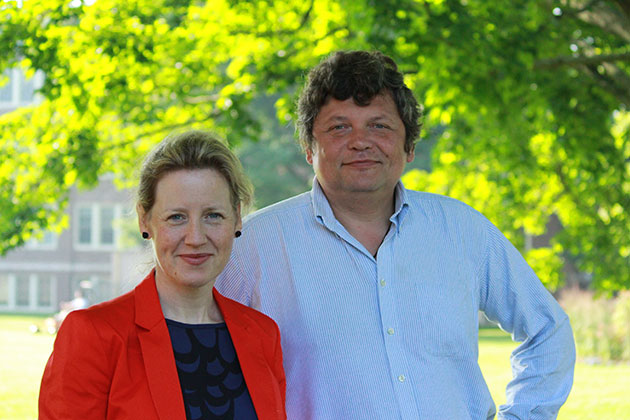
When Russian archaeologist Stanislav Dmitrievsky visited Chechnya’s capital Grozny during the first Chechen War in 1994, he was overcome with grief at the state of the city.
“What I saw was just so shocking and terrible that it changed my entire life,” he recalls. “I saw innocent citizens being bombed and killed by my own government. For three days I hid and crawled around the city, simply avoiding the constant bombs. These were extreme war crimes, crimes against humanity.”
When he returned to Russia, he began spreading the news, setting aside his life as an archaeologist.
Now, almost 20 years later, Dmitrievsky is one of the leading international advocates for justice surrounding human rights violations during the Chechen wars.
This summer he spent two months at UConn, learning English and working with Emma Gilligan, director of the UConn Human Rights Institute and associate professor of history, on her documentation endeavor called Chechnya Memory Project.
The project’s goals are to understand the everyday experience of war, to provide a forum to collate Internet testimony from citizens who lived through the wars, and to generate new and relevant research.
“The ultimate idea is to generate new information on the wars,” says Gilligan, a specialist in international law and human rights in Russia and the former Soviet Union in the 20th century and author of Terror in Chechnya: Russia and the Tragedy of Civilians in War (Princeton University Press, 2009). “The point is to include Chechen and Russian society in the discussion of their past through traditional oral history techniques, but also use the Internet as a forum for collating new information.”
Two wars, two storylines
In the 1990s, Chechnya was part of the Russian empire. There was a long history of tension between the Chechen and Russian powers: Chechnya wanted independence, and Russia wasn’t prepared to give it them.
After the first Russian-Chechen war, which lasted from 1994-1996, the political climate was extremely difficult, says Gilligan.
“The interim period wasn’t handled well by either the international community or the Russian state,” she explains. “The Chechen people were internationally isolated, which allowed more radical groups in Chechnya to emerge. That was part of the motivation for the second war,” which occurred between 1999 and 2005.
In the second war, says Gilligan, the indiscriminate bombing of civilian areas continued.
“A market in Grozny was bombed and a Red Cross convoy was bombed,” Gilligan says. “There were extrajudicial executions, torture, and forced disappearances. Caught up in all this were many civilians.”
But most of these events went unreported in the news media, she notes, because only very few, vetted journalists were allowed into the war-torn areas.
And that’s where human rights groups like the Russian-Chechen Friendship Society, started by Dmitrievsky, came into play.
With support from international organizations like the U.S. National Endowment for Democracy, Dmitrievsky’s human rights group published articles exposing the situation in Chechen cities. The Russian government labeled the group extremist, and its offices were ransacked and vandalized several times by masked, armed men. The society was eventually shut down by the Russian government.
Recently, Dmitrievsky was summoned for the 10th time to Russian court, this time for his 2009 book, International Tribunal for Chechnya. The monograph is a detailed account of human rights violations during the Chechen conflict, and includes a discussion of prospects for bringing the perpetrators to justice. The Russian government called it extremist and wanted to ban it from distribution.
But on July 2, in the Russian town of Nizhny-Novgorod, the court ruled that Dmitriesvky’s book was not extremist literature, and all charges were dropped.
A project of memories
The Chechnya Memory Project was initiated about five years ago, Gilligan says. “We asked: How we can use the Internet to collect testimony of people who have been victims in these wars, both in Chechnya and in Russia?”
Her inspiration is a similar memory project from the Sept. 11, 2001 attacks, which generated more than 40,000 narratives from people who lived through it. Working with UConn’s Thomas J. Dodd Research Center and University Information Technology Services, Gilligan is setting up a website where people can tell their stories anonymously online.
“We want to understand the demands, psychological and physical, of living in a war-torn country, to understand the movement of peoples across borders, and how they faced the challenges of destroyed homes, unemployment, and loss of family,” she says. “How do individuals cope with living in an everyday environment that is shaped by fear and uncertainty?”
Because of his work in advocacy and most recently at a Russian human rights documentation center in Norway, Dmitrievsky brings a much-needed legal perspective to the project.
“His perspective is through a legal lens, and mine is a humanities lens, an eye for personal stories,” she says.
Gilligan and her colleagues will analyze the anonymous data over the coming years and use it to raise awareness of human rights violations.
Especially since the recent Boston Marathon bombers had ties to Chechnya, Gilligan and Dmitrievsky point out, it’s more important than ever to put the Chechen experience into an international perspective.
“It’s extremely important that we understand where immigrants to this country are coming from, especially when it’s from an area of war-torn conflict,” adds Gilligan. “Today we have an authoritarian regime in Chechnya because justice has never been brought to the region. All these things ultimately affect the U.S. if we have refugees from that region.”


